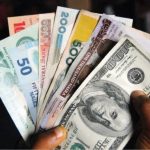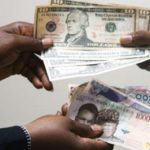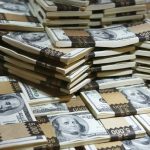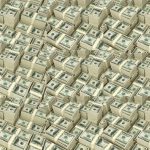After 10 months of consistent decline, Nigeria’s foreign reserves returned to a growth path, gaining $449.5m in one week.
According to the CBN, the reserves rose from $33.44bn in April ending to $33.9bn as at May 5.
The International Monetary Fund had stated that the sharp fall in international oil prices, together with reduced global demand for oil, was worsening the Nigeria’s fiscal and external positions.
The economy which remained highly reliant on foreign exchange proceeds and the recycling of petrodollars is expected to contract by about 3.4 per cent this year, a six percentage point drop compared to pre-COVID-19 projections.
After 10 months of consistent decline, Nigeria’s foreign reserves returned to a growth path, gaining $449.5m in one week.
According to the CBN, the reserves rose from $33.44bn in April ending to $33.9bn as at May 5.
The International Monetary Fund had stated that the sharp fall in international oil prices, together with reduced global demand for oil, was worsening the Nigeria’s fiscal and external positions.
The economy which remained highly reliant on foreign exchange proceeds and the recycling of petrodollars is expected to contract by about 3.4 per cent this year, a six percentage point drop compared to pre-COVID-19 projections.
After 10 months of consistent decline, Nigeria’s foreign reserves returned to a growth path, gaining $449.5m in one week.
According to the CBN, the reserves rose from $33.44bn in April ending to $33.9bn as at May 5.
The International Monetary Fund had stated that the sharp fall in international oil prices, together with reduced global demand for oil, was worsening the Nigeria’s fiscal and external positions.
The economy which remained highly reliant on foreign exchange proceeds and the recycling of petrodollars is expected to contract by about 3.4 per cent this year, a six percentage point drop compared to pre-COVID-19 projections.
After 10 months of consistent decline, Nigeria’s foreign reserves returned to a growth path, gaining $449.5m in one week.
According to the CBN, the reserves rose from $33.44bn in April ending to $33.9bn as at May 5.
The International Monetary Fund had stated that the sharp fall in international oil prices, together with reduced global demand for oil, was worsening the Nigeria’s fiscal and external positions.
The economy which remained highly reliant on foreign exchange proceeds and the recycling of petrodollars is expected to contract by about 3.4 per cent this year, a six percentage point drop compared to pre-COVID-19 projections.
After 10 months of consistent decline, Nigeria’s foreign reserves returned to a growth path, gaining $449.5m in one week.
According to the CBN, the reserves rose from $33.44bn in April ending to $33.9bn as at May 5.
The International Monetary Fund had stated that the sharp fall in international oil prices, together with reduced global demand for oil, was worsening the Nigeria’s fiscal and external positions.
The economy which remained highly reliant on foreign exchange proceeds and the recycling of petrodollars is expected to contract by about 3.4 per cent this year, a six percentage point drop compared to pre-COVID-19 projections.
After 10 months of consistent decline, Nigeria’s foreign reserves returned to a growth path, gaining $449.5m in one week.
According to the CBN, the reserves rose from $33.44bn in April ending to $33.9bn as at May 5.
The International Monetary Fund had stated that the sharp fall in international oil prices, together with reduced global demand for oil, was worsening the Nigeria’s fiscal and external positions.
The economy which remained highly reliant on foreign exchange proceeds and the recycling of petrodollars is expected to contract by about 3.4 per cent this year, a six percentage point drop compared to pre-COVID-19 projections.
After 10 months of consistent decline, Nigeria’s foreign reserves returned to a growth path, gaining $449.5m in one week.
According to the CBN, the reserves rose from $33.44bn in April ending to $33.9bn as at May 5.
The International Monetary Fund had stated that the sharp fall in international oil prices, together with reduced global demand for oil, was worsening the Nigeria’s fiscal and external positions.
The economy which remained highly reliant on foreign exchange proceeds and the recycling of petrodollars is expected to contract by about 3.4 per cent this year, a six percentage point drop compared to pre-COVID-19 projections.
After 10 months of consistent decline, Nigeria’s foreign reserves returned to a growth path, gaining $449.5m in one week.
According to the CBN, the reserves rose from $33.44bn in April ending to $33.9bn as at May 5.
The International Monetary Fund had stated that the sharp fall in international oil prices, together with reduced global demand for oil, was worsening the Nigeria’s fiscal and external positions.
The economy which remained highly reliant on foreign exchange proceeds and the recycling of petrodollars is expected to contract by about 3.4 per cent this year, a six percentage point drop compared to pre-COVID-19 projections.














